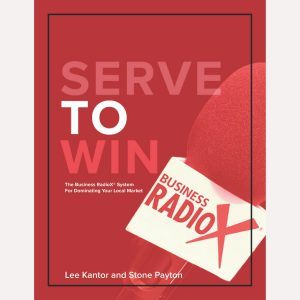
Stone Payton: [00:00:00] Welcome back to Business RadioX Pro Tips. Stone Payton and Lee Kantor here with you. Let’s talk a little bit today, Lee, about what we do, and what can and so often does happen in this room when the show ends. My favorite characterization for that point in the whole experience is the post-show glow. And for my money, it’s the whole reason we’re here, right?
Lee Kantor: [00:00:26] Right. This is an important component. You don’t want to rush this. That’s why we allocate an hour and a half for a show, that even though the show may last 30, 45, or even 60 minutes, we allocate an extra half an hour because we do not want to rush what happens after the show. We don’t want the guests ever to feel like they’ve got to get out of here. And we want to do everything in our power to kind of nurture those conversation, and encourage the chatter that happens after the show has ended. So, this is kind of your foray, and you do a great job of orchestrating this in the room here. But when we wrap it, when the episode ends, and we say, “We’ll see you next time on Atlanta Business Radio,” then, I look to you, and then you do your thing.
Stone Payton: [00:01:11] Yeah, that’s my cue to get started. You talked about follow-up questions in an earlier Pro Tip. To me, that’s the time to ask some follow-up questions and comment. “You know, Joe, when you mentioned early in your segment blah, blah, blah, that really struck a chord with me.” And it’s just the same thing you would do in another environment, like a cocktail party or another business meeting, to keep the conversation going. To me, that is so important to extend that experience. They want you to extend the experience. They don’t want to go anywhere. And you can learn so much and cultivate such a deep, rich relationship if you just take a breath, take the time, and invest that time and energy with the people in the room, and stay in the moment.
Lee Kantor: [00:01:59] Right. And help kind of facilitate conversation between the guests if there is a thing that one of the guests go, “Hey, there might be ways for you to work together,” or “You guys should definitely get to know each other.” Something you have to watch as a studio partner, if you have kind of a producer, if you’ve hired a younger producer especially, they tend to just go through a checklist, and want to rush this thing, and want to get them out the door because they want to be done, and they want to make sure they’ve done everything properly.
Lee Kantor: [00:02:27] It’s important to train them to kind of let — to breathe, like Stone said, and let the room kind of just talk, and let the show do what it does is kind of facilitate these conversations. And they work on their own if you just let the guest do what they want to do is chat and talk to each other. You don’t want to rush that moment. And then, when you feel it dying down, that’s when — when you see people looking at their watch or packing up, that’s when you want to say, “Okay. Now, it’s time to take pictures,” and then kind of try to kind of revitalize that a little bit.














